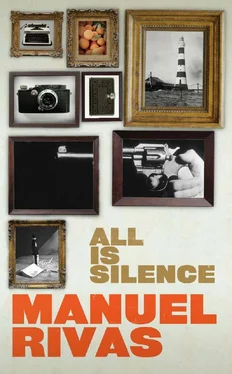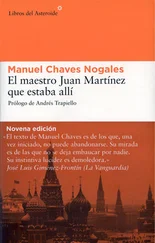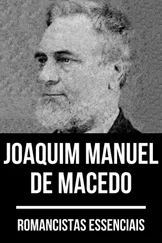O my godmother! You never know where to expect her next! Be amazed, blind mannequin. Be amazed, one-armed skeleton. Well, blow me down. Be amazed, Mr Crane. Be amazed, Mr Chelín. Because who should enter the stage but Nine Moons! Earth, swallow me up. No, Leda, you shouldn’t be here. What’s she doing in Operation Nostalgia? A century, a millennium, has gone by. Franco snuffed it years ago. Some weirdo went and shot John Lennon. Leda’s working in the Ultramar. She has a son with Brinco. And Brinco, well, he’s the number one. When Brinco’s involved, everything goes swimmingly. He’s the best pilot in the whole estuary. The best pilot in the world. There’s not a submarine will catch him. He’s got himself an iron angel, a fearless guardian. The women are crazy about him. What you doing here, girl?
Mr Nosy starts typing without paper. Reads aloud what he’s typing.
‘All is mute silense…’
‘You see? Was I right or not?’ says Leda. ‘Didn’t I tell you she wrote “silense” with an “s”? And you kept laughing, saying how would Rosalía de Castro write “silense” with an “s”?’
‘You were right. She could hear. “Silense” is more silent when it’s written like that,’ remarks Fins. The hole in the roof has grown bigger and the areas of shade on the map are smaller. ‘You can see better now. Your nails are painted black. You’re in the ocean.’
‘Like always. In the middle of the fucking ocean. Where letters never arrive. Just condolences. It was kind of you to write whenever someone died. My dad, the schoolteacher, the doctor. The condolences looked as if they’d come straight out of a book of correspondence.’
‘I remembered you, everything here, more than you can imagine.’
‘Every day, at all hours, right? I could feel some kind of Morse. Keys from the beyond. Of course you were learning how to touch-type. That must have taken a while.’
Fins gets up and heads towards her. Leda retreats until she’s leaning against the teacher’s desk, back in the shadows. As he approaches, she spits on the ground, in the sea, between the two of them. He remains still, quiet.
‘Well, I didn’t. I learned how to forget. Every hour of every day. I’m an expert at forgetting.’
‘To tell the truth, I thought a lot about myself. My life. And time went by.’
‘The boy with the absences!’
‘That’s in the past. I’m better now. Far too present.’
‘I have a son,’ she says with growing confidence. ‘A son by Víctor.’
Yes, he knows.
‘What do you want? Me to talk about Brinco? About Rumbo? The Old Man’s business? The Ultramar’s secrets?’
She realises her own cocky tongue has lost control of its traction. She’s about to say something concerning dynamite. But the word gets stuck. Goes back. Like the mouse scurrying across the ocean, through the rubble.
‘Do you know why I’m here, Fins Malpica? I have a message for you. I never want to see you again. Don’t call me, don’t talk to me, don’t even look at me. Understand?’
‘I’m not going to ask you for anything, Leda,’ replies Fins. ‘Or give you anything. Even if you ask, I’ve nothing left to give.’
They’ve gone now. What a conversation! Straight out of some soap. But it moved me. It really did. I was feeling so well, my warm body in the cold of the Antarctic, a tingling in my feet, thinking about the art of sea urchins and hermit crabs. My God, there was pain in both of them. I could see them as children playing on the beach the day they found the mannequin and carried it here, to the School of Indians. The jokes they had to put up with that day. And now I stay in my dark corner, huddled up, stiff with cold, staring at the great couple, the blind mannequin and the one-armed skeleton. I wonder what the dealer would give for them. A lump of hash. A globe of smack. Enough for two shots at least. He wouldn’t even open the door, the bastard. They’re obviously priceless.
Mariscal had a habit of rising with the sun. Having gone around various miradors, a duty he liked to fulfil with proud punctuality, in the mornings he would sit by the window to read the newspapers. He’d sometimes stop to do the crossword. Like today. He didn’t turn around, but heard the blast that opened the door and noisily cleared a way between stools and chairs before coming to an abrupt halt beside him. He’d nearly completed the crossword. He made it obvious he was in some doubt by repeatedly tapping the biro. He could hear a hum, the electric field of Brinco Furioso.
‘Where is Leda?’
‘Give me a hand here, will you? “Part of the chequebook that is left once the cheque has been removed.”’
‘Fuck, Mariscal.’
‘F-U-C-K. No, it’s not “fuck”.’
‘I don’t give a damn if he has a badge. I’m going to eat him up and vomit him off the bridge.’
Mariscal puffed on his Havana cigar and chewed, ground down the smoke. When he exhaled, the smoke was thick and stuck to the word, which appeared in the squares.
‘S-T-U-B. Now that’s it.’
He turned his head and glanced at the crazed lover.
‘Listen, Víctor Rumbo. I don’t like being shouted at from above and certainly not from behind.’
Brinco sat down opposite him. With a furrowed brow, but subdued gaze.
‘I sent her to see Malpica. To find out what the bastard wants. We need information. Information, Brinco!’
THE OLD LIGHT that spilled from the fluorescent strips still slid down the wall to illuminate the name of the dance hall and cinema Paris-Noitía. It could be spotted from the beach, at least by Fins Malpica. In the same way he could hear Sira’s voice, that refrain, ‘I’m not going, I’m not going’, which strangely made it easier to walk. ‘The prettiest love can go by, I’m not going, I’m not going.’ When, on a Sunday evening, she was persuaded to sing, things in the estuary already had their shadowy side. This was something Fins remembered, seeing his shadow projected on the shore. The eager progression of shadows towards the dance hall.
‘I’m not going, I’m not going.’
The cinema had closed some time before. And the dance hall opened only rarely to host some prearranged party. A footprint in the sand, ‘I’m not going’, another, ‘I’m not going’. He was far away, but inside he could see and hear. Memory had the intensity of an absence. He couldn’t tell anybody. He’d been back in Noitía for almost a year and the petit mal had returned several months earlier. The episodes were much more spaced out. But he could see them coming. They passed like intermittences. Blinks. The opening and closing of a window. He had a name for these absences. The Argonaut’s void. Because it was the petit mal , yes. But it was his petit mal .
Shortly after he left, the absences had disappeared. He thought the inconvenience would never reappear. And to begin with, when he returned, he didn’t have any short circuits. He could have said his mind went before him. Functioned well. He knew he had a long way to go, but he was starting to possess threads to weave with.
So the petit mal wasn’t exactly an illness. After a single absence, in an outburst of humour, he decided to make it a property. A secret belonging.
He stopped hearing the song, seeing the spectre of letters in the dance hall. From where he was, in the ruins of the salting factory, Fins could see San Telmo wharf. It was illuminated by a few street lamps. He could see people moving, but not distinguish them all clearly. Study their shadows. That was his trade.
At the end of the dyke, where there was a small lighthouse, stood two men. He could recognise them from a distance. One was unmistakable, with his hat and steel-tipped cane, moving in and out of the circles of light. When he was in a circle, Fins could see the white of his gloves and the tips of his shoes. It looked as if he was about to start tap-dancing. This was Mariscal. His eternal bodyguard, Carburo the giant, stood with his arms crossed, surveying everything, moving his head in time to the lighthouse beacon.
Читать дальше












